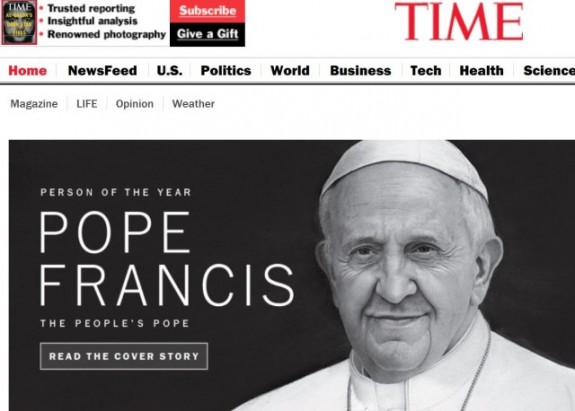My blog neighbor Rebecca Hamilton has a good piece up today on the attention swirling around yesterday’s announcement that TIME magazine had selected Pope Francis as Person of the Year.
On the one hand, he is named Person of the Year. On the other hand, he is attacked as a heretic and compared — with absolutely no basis in fact — with the most corrupt popes of history.
Why? Because he says that Jesus came to seek the lost, that we must not walk past Lazarus, that the prostitutes and drug dealers and homosexuals will enter the Kingdom of Heaven before the pharisees of our time.
He is accused of being a sell-out because known sinners are attracted to him. He is called outrageous names because he says blessed are the poor.
This honor of being named Person of the Year will almost certainly further inflame those who are so bitterly angry with him. After all, the honor — in all its temporal nothingness — comes from public sinners.
The problem here is that being declared TIME’s “Person of the Year” isn’t really an “honor,” as the editors of TIME will be the first to admit. It’s a distinction. But a dubious one.
Wikipedia describes how this year-end tradition began:
Person of the Year (formerly Man of the Year) is an annual issue of the United States newsmagazine Time that features and profiles a person, group, idea or object that “for better or for worse, …has done the most to influence the events of the year.”
The tradition of selecting a “Man of the Year” began in 1927, with Time editors contemplating newsworthy stories possible during a slow news week. The idea was also an attempt to remedy the editorial embarrassment earlier that year of not having aviator Charles Lindbergh on its cover following his historic trans-Atlantic flight. By the end of the year, it was decided that a cover story featuring Lindbergh as the Man of the Year would serve both purposes.
Since then, individual people, classes of people, the computer (“Machine of the Year” in 1982), and “Endangered Earth” (“Planet of the Year” in 1988) have all been selected for the special year-end issue. Despite the magazine’s frequent statements to the contrary, the designation is often regarded as an honor, and spoken of as an award or prize, simply based on many previous selections of admirable people. However Time magazine points out controversial figures such as Adolf Hitler (1938), Joseph Stalin (1939 and 1942),Nikita Khrushchev (1957) and Ayatollah Khomeini (1979) have also been granted the title for their impacts.
Some commentators are eyeing the selection with suspicion, and declaring that it’s an empty gesture.
They’re wrong. I think it carries weight for a number of reasons.
- It amplifies the significance of this papacy in the public arena, suggests that the wider world (not just Catholics) is interested in what he is doing, and underscores that something historic is unfolding.
- It throws a welcome spotlight on a figure of tremendous virtue and holiness, at a time when both qualities are in short supply in the world.
- If (as many expect) this issue sells well, it will serve as positive re-enforcement for an idea some cynics might find absurd — that is, good news sells. The Gospel is good for business.
- Finally, it confirms that a 2,000-year-old religion of over a billion people—with Jesus Christ as its head and a humble former bouncer as its earthly leader—maintains a dramatic and powerful hold on the world. Faith, quite simply, endures. You would have to look far to find any other force with that kind of moral authority, history, sweep and impact. The TIME selection says: The Catholic Church matters. Still. And this guy is having an effect. He bears watching.











